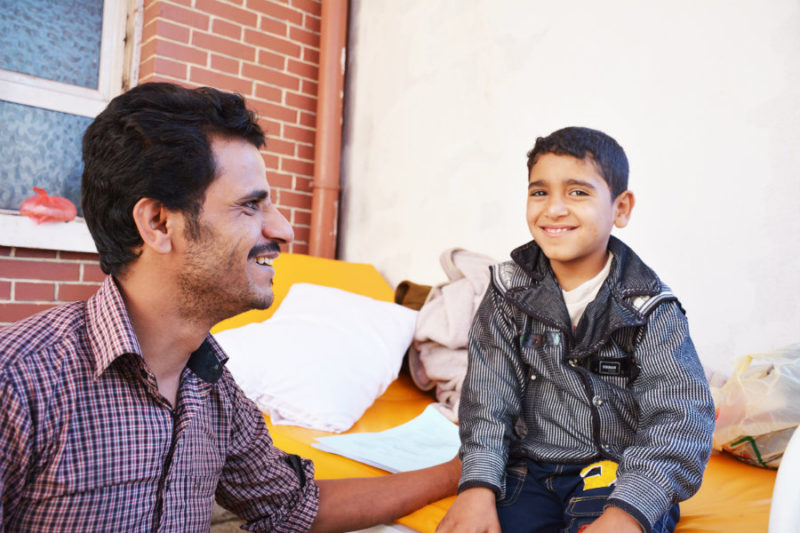Yemen is experiencing one of the world’s worst cholera outbreaks in the midst of a large scale conflict that has crippled vital health facilities. In the last three months almost 400,000 cases of suspected cholera and nearly 1,900 associated deaths have been recorded. The country is also on the brink of famine, with nearly two million Yemeni children acutely malnourished.
More than 30,000 health workers haven’t been paid their salaries in more than 10 months, but many still report for duty.
The World Health Organisation (WHO), World Food Programme (WFP) and the United Nations Children’s Fund (UNICEF) have also reported for duty, as the heads of the three UN agencies traveled together to Yemen to see the scale of this humanitarian crisis and to step up combined efforts to help the people of Yemen.
UNICEF Executive Director, Anthony Lake; WFP Executive Director, David Beasley; and WHO Director-General, Dr Tedros Adhanom Ghebreyesus, following their joint visit to Yemen, conclude in this statement that the Yemeni crisis requires an unprecedented response

As the heads of three United Nations agencies – UNICEF, the World Food Programme (WFP) and WHO – we have travelled together to Yemen to see for ourselves the scale of this humanitarian crisis and to step up our combined efforts to help the people of Yemen.
This is the world’s worst cholera outbreak in the midst of the world’s largest humanitarian crisis. In the last three months alone, 400,000 cases of suspected cholera and nearly 1,900 associated deaths have been recorded. Vital health, water and sanitation facilities have been crippled by more than two years of hostilities, and created the ideal conditions for diseases to spread.
The country is on the brink of famine, with over 60 per cent of the population not knowing where their next meal will come from. Nearly two milllion Yemeni children are acutely malnourished. Malnutrition makes them more susceptible to cholera; diseases create more malnutrition. A vicious combination.
At one hospital, we visited children who can barely gather the strength to breathe. We spoke with families overcome with sorrow for their ill loved ones and struggling to feed their families.
And, as we drove through the city, we saw how vital infrastructure, such as health and water facilities, have been damaged or destroyed.
Amid this chaos, some 16,000 community volunteers go house to house, providing families with information on how to protect themselves from diarrhea and cholera. Doctors, nurses and other essential health staff are working around the clock to save lives.
More than 30,000 health workers haven’t been paid their salaries in more than 10 months, but many still report for duty. We have asked the Yemeni authorities to pay these health workers urgently because, without them, we fear that people who would otherwise have survived may die. As for our agencies, we will do our best to support these extremely dedicated health workers with incentives and stipends.
We also saw the vital work being done by local authorities and NGOs, supported by international humanitarian agencies, including our own. We have set up more than 1,000 diarrhoea treatment centres and oral rehydration corners. The delivery of food supplements, intravenous fluids and other medical supplies, including ambulances, is ongoing, as is the rebuilding of critical infrastructure – the rehabilitation of hospitals, district health centres and the water and sanitation network. We are working with the World Bank in an innovative partnership that responds to needs on the ground and helps maintain the local health institutions.
But there is hope. More than 99 per cent of people who are sick with suspected cholera and who can access health services are now surviving. And the total number of children who will be afflicted with severe acute malnutrition this year is estimated at 385,000.
However, the situation remains dire. Thousands are falling sick every day. Sustained efforts are required to stop the spread of disease. Nearly 80 percent of Yemen’s children need immediate humanitarian assistance.
When we met with Yemeni leaders – in Aden and in Sana’a – we called on them to give humanitarian workers access to areas affected by fighting. And we urged them – more than anything – to find a peaceful political solution to the conflict.
The Yemeni crisis requires an unprecedented response. Our three agencies have teamed up with the Yemeni authorities and other partners to coordinate our activities in new ways of working to save lives and to prepare for future emergencies.
We now call on the international community to redouble its support for the people of Yemen. If we fail to do so, the catastrophe we have seen unfolding before our eyes will not only continue to claim lives but will scar future generations and the country for years to come.
